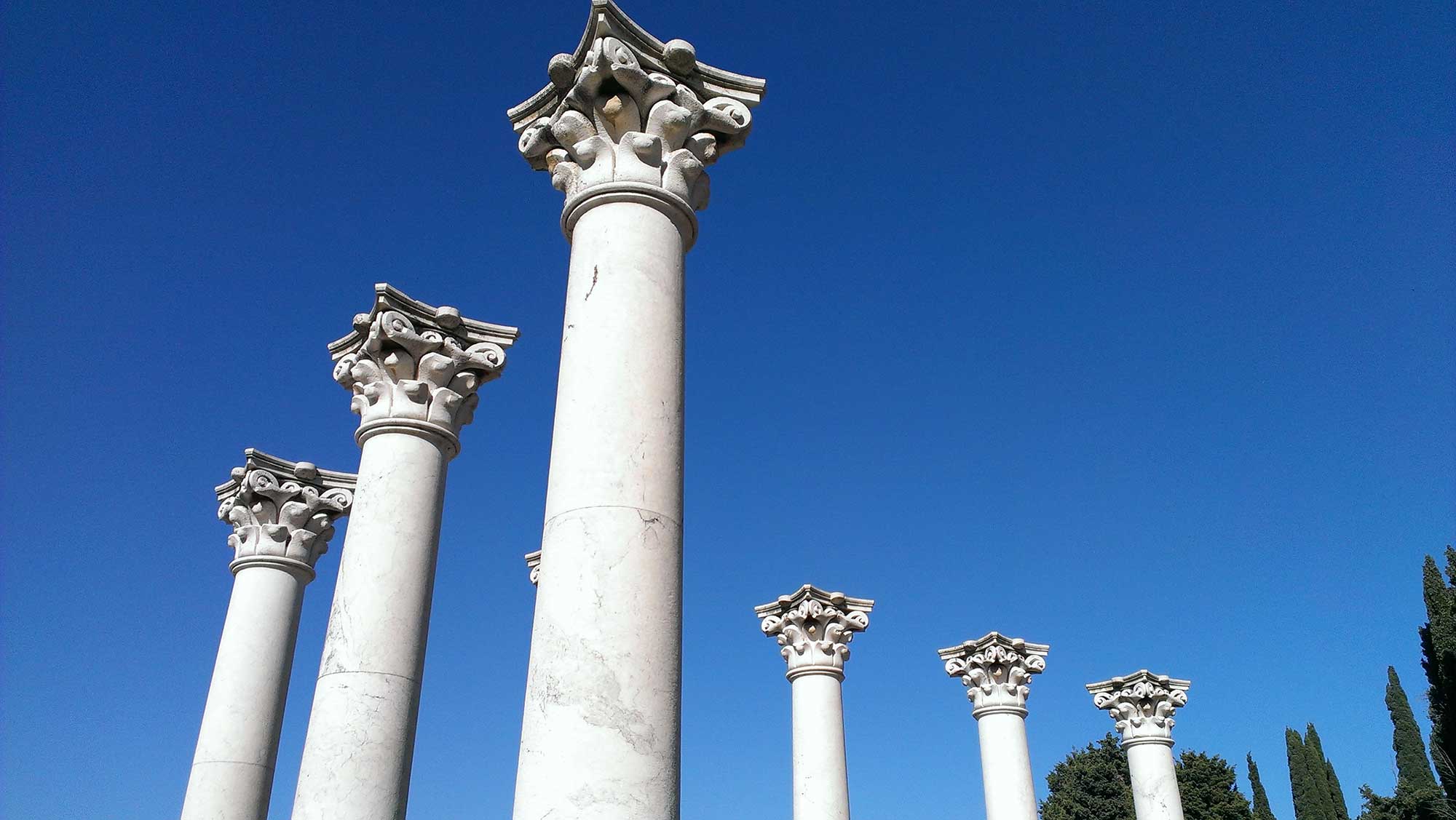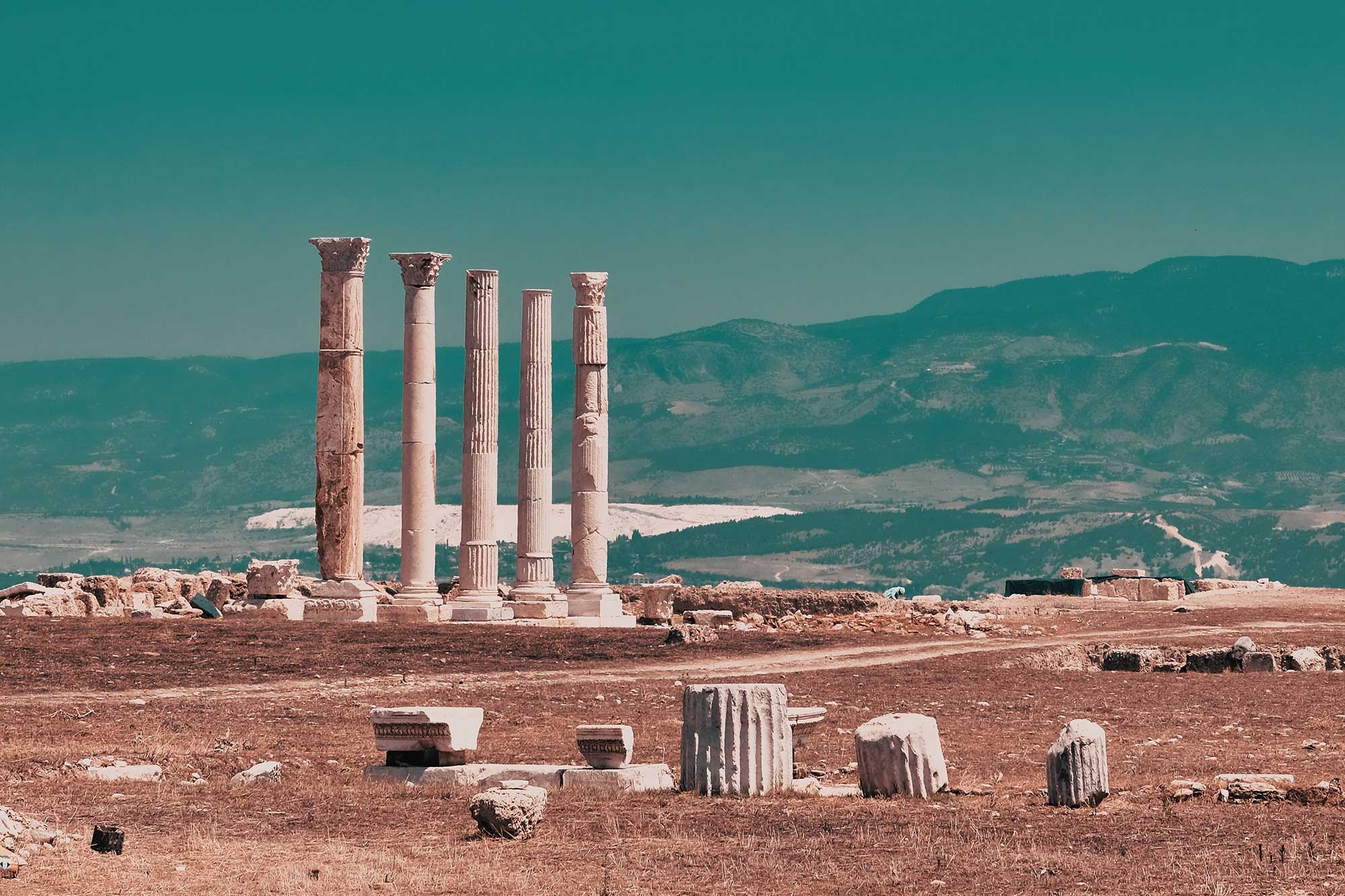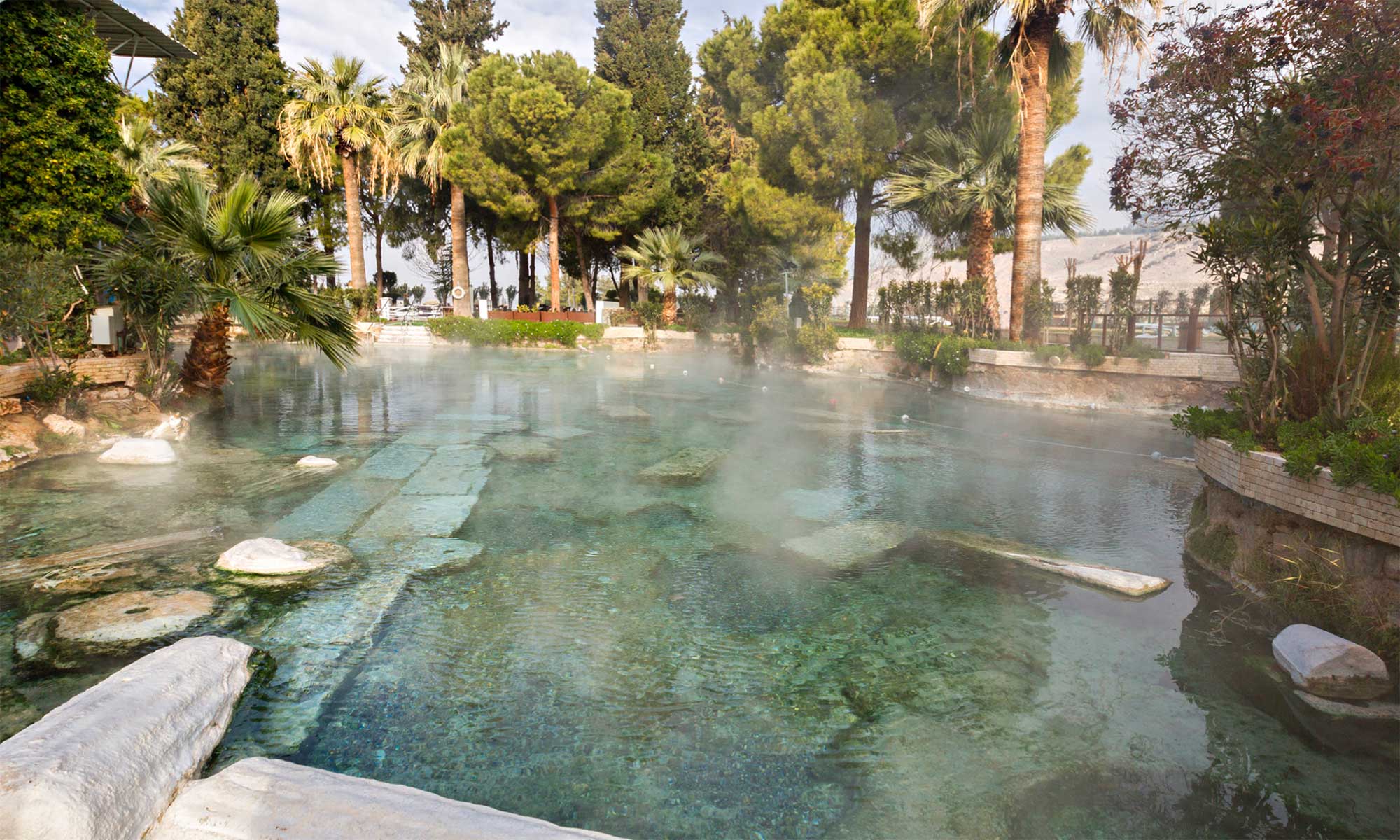
Revelation Hope – Sardis, Philadelphia & Laodicea
The Message to Sardis
Read Revelation 3:1–6
The tone of this letter is different right from the start.
There is no praise, only harsh evaluation.
This church gets much praise from people; it is respectable.
We do not hear of Balaam, the Nicolaitans or Jezebel.
But God sees it differently.
This church is living on a reputation of being alive; but in reality it is dead (see Revelation 3:1).
This church is living on a reputation of being alive; but in reality it is dead (see Revelation 3:1).
It is told to wake up before it’s too late.
Things here are a lot worse than in Thyatira.
To some extent, this counsel is also reflected in the history of the city itself.
Today the town is found in a fertile valley.
Some 600 years before this letter was written, Sardis was one of the greatest cities in the ancient world.
Once it was the old capital of the Lydian empire, ruled by the wealthy Croesus.
But its prestige in the ancient world was lost. Glory, power and wealth were found only in its past.
Some had not soiled their garments (see Revelation 3:4).
They are told they will walk with Jesus dressed in white.
These are the garments we receive when we accept Christ.
Here we see the idea of a godly remnant again. Many like to feel comfortable being with the majority.
Yet in the worst of times, there is always someone who will be faithful.

Some of the Old Testament stories provide examples.
In the days of Noah, would you have gone into the ark?
When Elijah stood alone against the prophets of Baal and all the people were with them, would you have stood with Elijah?
We cannot measure truth by a majority vote.
When it comes to matters of faith, it seems the majority are usually wrong.
Like the church at Sardis, we can see how there was a period in history, when the church at large was asleep and needed to be woken up.
The church had lost the gospel message and the Bible was kept locked in a dead language.
The wake-up call came in the form of the “Reformation.”
Brave men and women risked their lives as they tried to arouse the church out of its slumber and dead formalism.
They rediscovered the gospel and put the Bible in the language of the people.
The printing press made this possible. Wars were fought and much of the Christian world was drawn into this conflict.
Eventually, a truce was called and new churches came into being.
Sadly though, once the reformers died, lifeless formalism began to creep back.
Even in the darkest times, when most turned their back upon the Creator, there have always been some faithful to God.
The Big Picture
Early in the history of the Christian church problems not unlike those at Pergamum developed when pagan practises began to make inroads into the habits and practises of Christians.
John sees similarities in the experiences of Christians at Thyatira and the experiences of Israel in Old Testament times.
He uses those experiences to depict what is now happening to them.
An important key to understanding Revelation is to see the Old Testament experiences of Israel in the language and symbolism John uses to explain what is happening to Christians.
The messages to Sardis, Philadelphia and Laodicea challenge Jesus’ followers to be authentic, active and fully committed.

The Message to Philadelphia
Revelation 3: 7-13
The ancient city of Philadelphia was a prosperous city that lay on the imperial post road.
The name “Philadelphia” means “brotherly love,” and it was built for the promotion of the Greek language and culture.
But one historian calls it a “city of earthquakes” because its geographical location made it subject to occasional earthquakes.
The same earthquake that struck Sardis in 17 AD also hit Philadelphia, almost completely demolishing the city.
As with Sardis, it was rebuilt but little remains to be seen of the ancient city itself, as the modern city of Alasehir is built over the site.
Excavation is being done on the old city so eventually, more of its ancient structure will be revealed.
Remarkably, nothing is said against this church.
It is only commended.
Along with Smyrna, Philadelphia is in the best spiritual condition of all the seven churches.
Revelation 3:7 and 8 mentions the “key of David.”
Jesus declares Himself to be the one who holds the key of David.
He has the authority to open and to shut, making Him the one who controls entrance to the royal palace, the place where the authority of the kingdom concentrates.
The language of this text is based on Isaiah 22:22, which says of Eliakim:
“I will place on his shoulder the key to the house of David; what he opens no-one can shut, and what he shuts no one can open.”

In the letter to the church at Philadelphia, Jesus is the one who claims to have the full authority and access to the heavenly storehouse. This is why He is able to make wonderful promises to this church.
As in Smyrna, the members of the church at Philadelphia experienced conflict in relation to the local synagogue.
It is likely the Christians of Philadelphia found themselves cut off from the synagogue, and they may have questioned whether they had lost their place in heaven as well.
Jesus assures the church at Philadelphia that He—and He alone—decides who enters the temple of God. He is the open door.
As long as people everywhere remain in a relationship with Him, their position with God is secure.
Because they had kept the word of Jesus and not denied His name, Jesus makes some wonderful promises to them:
He puts before them an open door that no-one can shut. Many commentators have pondered what that meant.
Most seem to see it as a door of missionary opportunity.
Paul uses a similar expression in 1 Corinthians 16:9.
Another promise concerns those who pretend to be Jews being humiliated eventually (see Revelation 3:9 ).
These are the enemies of the Philadelphians who will one day be forced to admit that God is with the Philadelphian Christians.
A further promise is for patiently enduring by keeping God’s commands.
They will be kept from the hour of trial that is coming and will be protected (see Revelation 3:10).
The term “hour of trial” applies to the judgments of God coming on His enemies and the enemies of His people.
Centre for Spreading the Gospel
The geographical position of Philadelphia as a city was meant to be a way of spreading Greek culture.
But it also became a centre for spreading the gospel. Like all the other churches, its experience can be mirrored in great eras of Christian church history.
• The apostolic era was a time when great progress was made in spreading the good news about Jesus.
The 18th and 19th centuries were a time of the great Protestant missionary efforts.
Today, many areas of the world reflect the Philadelphian experience, such as China, Africa, Southern Asia, Latin America and many of the island nations of the Pacific.
Before Jesus comes again, there will be an even greater Philadelphian experience when the gospel goes to the whole world
(see Matthew 24:14)
(see Matthew 24:14)

The Promise
Difficulties with the local synagogue led Philadelphian church members to question their access to God.
This divine letter tothe church assures them of their continued channel to God in Jesus Christ. Jesus holds the key of David and He opens the door into heaven for them.
He will make them like a pillar in the temple, always part of God’s inner circle.
God promises to make us a pillar in the temple of our God (see Revelation 3:12). This is the language of the Old Testament temple, which is used throughout Revelation.
We will see this again when we look at the throne room of God.
God promises to make us a pillar in the temple of our God ( see Revelation 3:12).
This is the language of the Old Testament temple, which is used throughout Revelation.
We will see this again when we look at the throne room of God.
As we have discovered already, each vision in Revelation begins with a scene from
the heavenly sanctuary, using words for describing the earthly sanctuary to also describe the heavenly reality.
The Book of Revelation is full of allusions to the heavenly temple and declares that the people of God will perform priestly services before Him day and night in His temple (See Revelation 7: 15–17, 22: 2–5).
Included in the promise to Philadelphia is permanent dwelling in the innermost part of the heavenly temple.
Christians will always be in the divine presence.
This means they will have a major role in governance of the universe (see Revelation 3:21).
Although often weak and despised on this earth, God’s people will be elevated to the highest place in eternity.

The Message to Laodicea
Read Revelation 3:14–22
In each of the seven letters, Jesus emphasises what needs to be heeded in every church for all time.
Ephesus – To return to first love.
Smyrna – To hold fast under persecution.
Pergamum – To not compromise the faith.
Thyatira – To be faithful in the midst of evil.
Sardis – To strengthen what remains.
Philadelphia – To see a door is open to spread the good news of Jesus.
Laodicea – To be authentic


The name Laodicea means “judgment of the people”.
Surprisingly, there is no apostasy or heresy, or even a “Jezebel”—but Jesus cannot find anything good to say about this church.
The church in Laodicea was unattractive and useless, like the lukewarm parts of a pool.
It was satisfied with less than God’s best.
Jesus makes a most interesting response to their lack of commitment:
“I want to throw up—vomit—when I look at you.” It’s a serious charge. Laodicea is a church in trouble.
Jesus Makes them an Offer
The second part of Jesus’ analysis charges the church with self-delusion: what she says and what she is are different things.
Laodicea is blind to her true condition, not living in reality:
“You say, ‘I am rich; I have acquired wealth and do not need a thing.’ But you do not realise that you are wretched, pitiful, poor, blind and naked” (Revelation 3:17).
In many ways, Laodicea—asset rich but spiritually poor—is the opposite of Smyrna, which was actually poor but spiritually rich.
Apparently, it is easier to deal with spiritual death than with indifference.
Jesus counsels the church that it is time to do something about its lack of authenticity.
He asks the people to buy from Him things they think they don’t need:
“I counsel you to buy from me gold refined in the fire, so you can become rich; and white clothes to wear, so you can cover your shameful nakedness; and salve to put on your eyes, so you can see” (Revelation 3:18).

Does Laodicea need gold?
No. She thinks she is rich.
But Jesus offers spiritual wealth—“gold refined in the fire”—that is, pure gold with no other additives mixed in with it.
Elsewhere in Revelation, gold is spoken of literally (see Revelation 17, 18 and 21).
The only place where gold is used figuratively in the New Testament may help us understand this offer to the Laodiceans:
“These have come so that your faith—of greater worth than gold, which perishes even though refined by fire—may be proved genuine and may result in praise, glory and honour when Jesus Christ is revealed”. (1 Peter 1:7)
According to Peter, “gold” is a tested, trustworthy faith that can last until the end.

A Loving Relationship is Built on Trust
Earlier in the letter to Sardis (see Revelation 3:4, 5) we found the meaning of the white clothes Jesus offers to the Laodiceans.
Here, the white garments are both a present and a future reality.
They are offered to the last-day people of earth’s history during the battle of Armageddon:
“Behold, I come like a thief! Blessed is he who stays awake and keeps his clothes with him, so that he may not go naked and be shamefully exposed” (Revelation 16:15).
The garments represent the garments of salvation.
To be dressed in the garment is to be right with God.
During His earthly ministry, Jesus told a story about people wanting to get into a wedding without a wedding garment.
But to gain entrance, they had to be wearing the wedding garment
(see Matthew 22:11–14).Imagery of weddings or marriages is used frequently in Revelation to describe the joyful experience that comes to those who are in a right relationship with God.
Marriages are happiest when deep love and trust are the basis for the union.
This enables the couple to stand by each other when difficulties arise.
The followers of Jesus are described as being the “bride of the Lamb”
(see Revelation 19:7-8)
They are dressed in white, which John uses in Revelation to portray those who truly belong to Jesus.
God wants to tell us how becoming a true follower of Jesus has more to do with a deep love and trusting relationship than anything else.
It is only when we have this love and trust that we can ever be really happy.
Being in a right relationship with God through Jesus brings with it all the joy of a wedding.
Being in a right relationship with God through Jesus brings with it all the joy of a wedding.

Further Love Offerings
In view of the seriousness of the Laodicean’s problems, Jesus offered further counsels to the church in Revelation 3.
-
Be earnest and repent (verse 19).
He can speak strongly because love is the source of His discipline.
God particularly addresses the most faithful and the least faithful churches with love.
.
- Of all the seven churches, love is offered only to Philadelphia and Laodicea.
But, to Laodicea, His message of love comes in the form of discipline and a rebuke.
He comes and knocks on the door, wanting them to invite Him in:
“Here I am! I stand at the door and knock. If anyone hears my voice and opens the door, I will come in and eat with him, and he with me” (Revelation 3:20).
-
Keep their eyes on the reward (verse 21).
If Laodicea will open the door, she will be able to sit down at the table in the heavenly kingdom to a meal of mutual fellowship. She will have a place at Jesus’ throne.
-
Finally, listen to the Spirit (verse 22).
If Laodicea listens to the Spirit, she will be disabused of her strange ideas, come to realise her true condition and be committed.

Laodicea’s Message:
A Beautiful Invitation for all
Does the church at Laodicea have a broader connection with church history?
As shown previously, the spiritual experiences of the seven churches feature, at times, eras of church history.
Later on, we will see a connection with Revelation 16:15, which is part of the description of Armageddon.
It suggests that John himself saw a model in Laodicea of how the church would be just before Jesus returns.
This end-time church goes through the motions and does many great things yet a heart relationship is often absent.
It is sobering to realise that the last church of earth’s history may be the most troubled one.
If we are part of that church, it is clearly time to think about the implications.
Revelation 3:17 tells us of the Laodiceans’ need to know they were naked spiritually.
This is also a prompt for people who need to receive the sinless life of Jesus in place of their own faulty life.
Quite simply, Revelation 3 verses 19 to 21 are a beautiful invitation.
For a little more……..